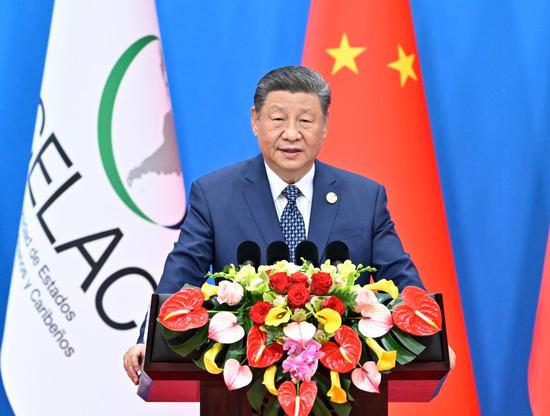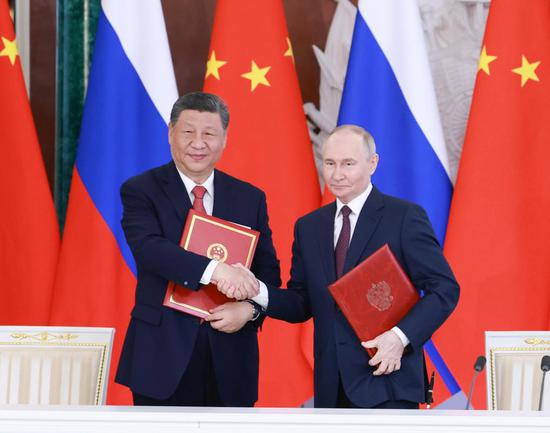
A staff member (middle) of a securities company explains stock related services to investors in Jiaxing, Zhejiang province, in October. (JIN PENG/FOR CHINA DAILY)
The improving financial literacy of ordinary Chinese investors will lead to rational investment decisions and long-term financial plans, which in turn facilitates the maturity of the financial market, said experts.
Their comments follow the results from a report showing that Chinese people's average score for financial literacy is 71.8 out of 100 at present, up from 68.7 a year earlier.
The progress can be attributed to a higher proportion of respondents with advanced education, the low-scoring group's efforts to address gaps in basic financial knowledge, and increased awareness of financial risk and fraud, according to the report.
The report, jointly compiled by Shanghai Jiao Tong University's Shanghai Advanced Institute of Finance and global financial service provider Charles Schwab, has been issued since 2022.
The latest results show a strong link between financial literacy and practical skills. In general, polled interviewees with financial investment experience score higher across all six gauges, including currency and banking, savings and investing, financial planning, safety and security, among others.
Improvements in financial literacy usually foster more rational and healthy investment practices, according to the report. For example, among the high-scoring respondents, 57 percent held positions for longer than one year, compared to only 45 percent among low-scoring respondents.
Respondents with higher financial literacy also build more diversified portfolios and exhibit less speculative behavior, according to the report.
Based on these findings, Wu Fei, a SAIF professor and the project leader, suggested tailor-made financial education for different groups.
"For the high-frequency and complex securities investments group, we can focus education on investment discipline, the risk-return trade-off, and risk awareness to help them avoid excessive speculative behavior," said Wu.
Meanwhile, respondents with higher financial literacy demonstrate a better understanding of retirement planning as well as its necessity and different ways of saving for retirement. These high-scoring interviewees are more proactive in joining the private pension account program, which was promoted nationwide in end 2024.
However, long-term planning still needs further underscoring in China. Only half of the interviewees said they have "a clear, specific and long-term financial plan", slightly down from the ratio last year.
Even for adults aged between 26 and 45, who face complex financial needs and are at a critical juncture for retirement planning, only 55 percent of them have constructed a long-term financial plan.
According to Thomas Pixley, general manager of Charles Schwab (Shanghai), a long-term financial plan is especially important given the changing global economic landscape and the aggregating market complexities. Such a plan can help individuals weather market fluctuations and avoid pain.
"There is one saying from a US boxer that goes: everybody thinks they have a plan until they get punched in the face. In other words, the personal financial plan should include risks and market volatility. And of course, diversifying the investment portfolio is also important," Pixley said.
On top of that, individuals' maturity in investment habits is also conducive to the development of the financial industry, he added.
Xu Haining, former vice-president of Orient Securities, said that the proliferation of long-term planning is indispensable from the bigger role taken by professional financial institutions. The expansion of these institutions will usher in more long-term capital inflows, helping to lower market volatility. Under such circumstances, both institutions and individuals can make plans more at ease, she said.
Based on her experience of working with various clients, investor education still needs further strengthening in China. Even some successful entrepreneurs, who are hardworking and experts in their own fields, have devoted far from sufficient efforts in financial planning, let alone ordinary investors, she said.
After China's rapid economic growth for decades, product consumption will gradually decline while consumption for services will increase. As mutual funds lower their fees, the country implements new rules and regulations over the asset management industry, and the investment advisory industry matures, consumption of financial services will see commonplace, according to Xu.
"All these indicate opportunities for financial service providers. By truly understanding clients' demands, financial institutions can optimize their business models, which in turn facilitate people's long-term financial planning," she said.


















































 京公網安備 11010202009201號
京公網安備 11010202009201號